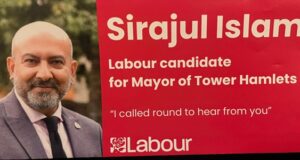The televised debate on the EU aired on 26th May hit the headlines.
First, we heard that a cheeky chap in the audience had asked presenter Victoria Derbyshire out on a date. What a card! It’s amazing just how many areas of life the EU influences, isn’t it? Ms Derbyshire declined, by the way.
The big news, however, centred on Emily, who said that her mother needed a bungalow because she was disabled – but her mum could not get a bungalow because migrants were being bumped up the queue. Emily was therefore inclined to vote to leave the EU. Oh dear.
Is Emily right to attribute lack of bungalows in sunny Poole to an excess of queue-jumping immigrants?
In the same week as Emily made her point, new figures showed that net immigration to the UK was 333,000 last year (2015). Official figures show the UK population was 64.1 million (2013). Last year’s net immigration would amount to a 0.005% increase in the UK’s 2013 population (not the prettiest sum, but one using the most conveniently available figures). The 2011 census showed that Poole had a population of 147,645. A 0.005% increase in that population would amount to 738.224 people – 739 in round numbers (you can probably only round a quarter of a person up, not down). Not all of these immigrants need social housing: some are spouses or close family members coming to join families who are already houses; some will be workers or rich people who will find private sector accommodation. Some of the immigrants will live together – they will not all be single people. Sunny Poole will have to accommodate maybe 500 extra households in its 150k population. Are they really soaking up all the available bungalows?
We don’t know how many bedrooms Emily’s mum needs in her bungalow. The Right Move website claims that house prices in Poole rose 4% last year. It has a number of bungalows for sale: a 5 bedroom detached bungalow (£1.5 million); a 4 bedroom one (£1.325 million); a 3 bedroom one (£1.22 million). There’s a couple of bargains: another 4 bedroom one is £889,950 and a 5 bedroom one is on sale at £850,000. There’s even a three bedroom bungalow going for £750,000 (well, offers over £750,000, anyway).
This is a much better clue to the reason why Emily’s mum can’t get a bungalow. Homes are just plain unaffordable to ordinary people who would like to buy a house and live in it. Prices have reached a stage where homes can only be bought by those who are of the right age to have made money on the rising property market before, have won the lottery – or are buying up homes to rent out privately. This last category of people are often subsidised by the taxpayer, through housing benefit.
Emily should be careful in her search for a remedy to her mother’s housing need.
If the UK votes to leave the UK, it will take a couple of years to effect the exit – and then there will be fewer nationals of EU states with the right to live in the UK. There will be an exodus of EU nationals currently working and paying tax in the UK – causing a slump in the economy which the Tories may well tackle by reducing benefits, including housing benefit, yet again. The current Government has just passed the Housing and Planning Act 2016, which sets about rationing social housing – with new tenancies being restricted to a set number of years. There’s nothing to guarantee that under this legislation Emily’s mum will be entitled to social housing, anyway.
As EU nationals leave the UK, we cannot guarantee that UK nationals won’t be thrown out of other EU states – or forced out economically, if and when EU arrangements no longer apply and they have to buy their own healthcare, etc. If one million UK pensioners return from Spain in 2018, Emily’s mum may find it’s not the immigrants who are competing for her bungalow.
If this had been a reality show rather than a referendum debate, some private developer would have stepped out of the wings and surprised Emily live on air by telling her he had a just built a bungalow and her mum could come and live in it and he would be happy to cap the rent at what housing benefit could pay. It didn’t happen, though: surprise, surprise – developers build for profit these days, maximum profit.
If there are so many immigrants occupying bungalows in Poole, why doesn’t Emily visit them on behalf of her mother and ask them if they would consider a mutual exchange? Immigrants can be very nice people who don’t like to see others suffer. It may well be all the same to them where they live, so they may well be prepared to swap so that Emily’s mum can have their bungalow and they can manage her stairs.
Emily needs to take her blinkers off and wise up to the real causes of the housing crisis. Like a bungalow – she doesn’t have much going on upstairs.
[Adverts]
 East London News A Force for the community…
East London News A Force for the community…




